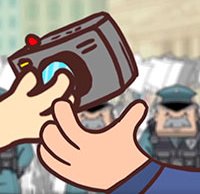Don’t hand over that camera! Photography in U.S. public spaces is your constitutional right.
posted Thursday, July 14, 2016 at 3:59 PM EST

Despite your constitutional right in the United States to photograph in public spaces, it is still possible that you will encounter a situation in which a law enforcement officer or other public official will request that you stop what you are doing. They may even threaten or arrest you. It's an unfortunate reality that you can be harassed despite not breaking any laws. The American Civil Liberties Union created a helpful slideshow a few years ago with information for photographers which is aimed at giving you knowledge about your rights and advice on what you should do if you are stopped or detained for taking photos.
What are you legally allowed to photograph in a public space? You have the right to photograph anything which is in plain view. Police officers, federal buildings, transportation buildings and much more is completely fair game. Of course, the situation changes entirely when you are on private property, so be aware of where you are as private property owners have the right to have you removed from their property.
Although not specifically mentioned in a Supreme Court ruling that determined police officers may not search your cell phone without a warrant, the ACLU believes that the constitution also protects your camera against being searched without a warrant. Unless they can provide a warrant, you are not obligated to show police officers any of your images or allow them to confiscate your camera or memory card(s). Additionally, police are never allowed to delete any of your images.
What should you do if you are stopped or detained? The ACLU recommends that you remain calm and polite and not escalate the situation. Keep in mind that if you don't ask an officer if you're free to go, then you are tacitly consenting to being stopped and questioned. If you ask and are told that you're not free to leave, you're being detained. You have the right to ask why you're being detained. Don't forget to mention that your taking photos in a public space is an exercise of your First Amendment right. When in doubt, be polite and ask if you can leave.
There are special considerations regarding video recordings, particularly those with audio captured. For more information on this and much more, see the slideshow at the ACLU's website.